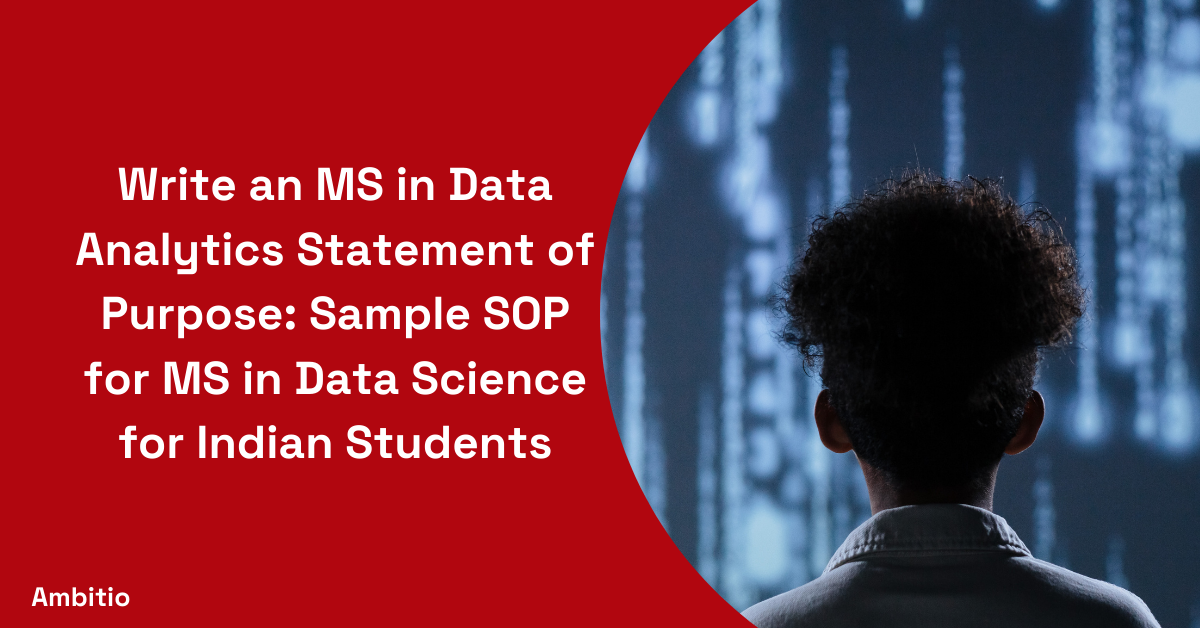21 April 2025
7 minutes read
Write an MS in Data Analytics Statement of Purpose: Sample SOP for MS in Data Science for Indian Students

Key Takeaways
- Data analytics statement of purpose helps showcase your passion, skills, and career goals aligned with top programs in data science and analytics.
- Data analytics statement of purpose must highlight relevant coursework, programming knowledge, and your vision for becoming a data analyst or scientist.
- Data analytics statement of purpose strengthens your application by connecting academic experiences with real-world applications in the field of data analytics.
A great statement of purpose (SOP) can be the deciding factor for whether or not you receive admission to your desired data science program. For all those who are looking to do a masters in Data Analytics or an MS in DAS, this SOP becomes a vital document, and more often than not, it serves as your voice amidst a deluge of applications. If you are moving from computer science and engineering, business development, or have science as your major, an SOP that is well structured can make all the difference.
What is a Statement of Purpose for MS in Data Analytics?
A statement of purpose is a letter that describes your academic history, professional goals, and why you wish to join a specific university and program. When applying for a data science or analytics program, your SOP should demonstrate your interest in data, project your extracurricular activities, and describe why the program is essential to your professional ambition.

Fun Fact: Do you know that most elite universities place as much importance on SOP as they do on your test scores in GRE, ACT, IELTS, TOEFL, SAT, or GMAT?
Why You Need to Write an SOP for Data Analytics?
If you’re applying for a master’s in data analytics, your SOP for analytics must show more than just academic merit. It must reflect your grasp of data structures and algorithms, your exposure to programming languages, and your practical experience in data analysis.
SOP Elements to Include:
| Element | Description |
|---|---|
| Academic Background | Highlight relevant coursework like data science courses or computer science course. |
| Technical Skills | Mention programming in Python, R, or SQL, and understanding of structures. |
| Projects | Describe a data corpus for the project or how you handled raw data corpus. |
| Work Experience | Detail your journey working as a data analyst or in business analytics. |
| Career Goals | Discuss becoming a data analytics expert or a data scientist. |
What Makes a Good SOP for Masters in Data Analytics?
A good SOP or a winning SOP doesn’t just list achievements. It tells a story. It shares how you explored the concepts of data science, used your skills to make better business choices, and now seek advanced knowledge through an analytics course.

Tips to Make Your SOP Stand Out:
- Always tailor the SOP to the university and its analytics program.
- Showcase your passion for data through real examples.
- Connect your long-term career goals to the program.
- Be honest and authentic.
Sample SOP for MS in Data Science Program
Many students aspiring to study abroad search for a sample SOP for data science or for MS to get an idea. Below is an outline inspired by SOP samples shared by top universities.
Riya Menon, a recent graduate from St. Xavier’s College, is writing the SOP for Master’s in Data to pursue her academic and professional goals in the field of data science.
SOP Sample
From an early age, I found myself fascinated by patterns—whether in nature, music, or even people’s behavior. This fascination gradually matured into a desire to understand how raw information transforms into actionable insights. Choosing science as my major in high school was the first step toward that journey, and it culminated in my undergraduate studies in CS from St. Xavier’s College, Mumbai. Now, I am writing this SOP for master’s in data to secure admission into the Data Science program at Lincoln Tech University, where I can further refine my skills and contribute meaningfully to the data revolution.
My academic experience has been a blend of curiosity and challenge. During my undergraduate studies, I engaged deeply with subjects like statistics, linear algebra, and machine learning. I also enrolled in a course in data analytics, which introduced me to the real-world applications of data in domains such as healthcare and finance. The exposure to tools like Python, R, and Tableau helped me grasp how data science is not just theoretical—it’s alive, practical, and used to make better business decisions daily.
For my final-year project, I worked with a team on a dataset from a retail company, aiming to predict customer churn. The project taught me that data science is a document of stories hidden in datasets, waiting to be told through well-designed algorithms and thoughtful visualization. It was this realization that ignited my interest in pursuing a degree in data science and becoming part of the growing demand for competent data analysts in the global job market.
Professionally, I interned at MetricsNow, where I was involved in data cleaning, transformation, and report generation. I was part of a team that helped a logistics company identify inefficiencies in its delivery pipeline—an experience that showcased how data could be used to make better business strategies. The collaborative and problem-solving nature of that work solidified my decision to pursue a degree in data analytics.
Along with this statement, I have submitted transcripts, letters of recommendation, and my resume. I believe these documents offer a comprehensive view of my preparedness for your program. However, I hope this SOP provides a more personal insight into my passion and readiness for the academic rigor ahead.
I understand that a perfect SOP is not one that just lists achievements, but one that reflects purpose. My purpose is clear: to evolve into a skilled data scientist who can make sense of chaos and turn it into clarity. This data science SOP is my first step toward that future.
In conclusion, I seek admission to your MS in DAS program not just for the prestige of a reputed university, but because I see it as a crucial step in building a lifelong career in analytics. I am excited to explore the vast opportunities this field offers and to contribute to innovations in data-driven decision-making. I am confident that with the right guidance, infrastructure, and collaborative environment, I can thrive and grow into an impactful professional in this dynamic discipline.
Writing SOP for Data Analytics: Step-by-Step SOP Writing Guide
SOP writing is not just about words; it’s about strategy.

Here’s a breakdown:
1. Introduction
- Explain your background in CS or any other relevant domain.
- Hook the reader by describing your first tryst with the field of data analytics.
2. Academic Journey
- Mention key subjects like data structures and algorithms, CS course, and science course.
- Talk about academic projects linked to data science through my degree.
3. Professional Experience
- Discuss roles where you were working as a data scientist or involved in business analytics.
- Share quantifiable achievements.
4. Career Aspirations
- Describe how this degree in data will help you become an analytics expert.
- Emphasize your desire to make better business choices with analytics.
5. Why This Program?
- Align your interests with the data analytics program offered.
- Mention unique features like data science community exposure, or specialized analytics must courses.
6. Conclusion
- Reiterate your commitment to the field of data science.
- End with how you see yourself contributing to the data science and data analytics space.
Writing Tips for SOP for Data Analytics
You can find multiple sample SOPs for data science, and for MS online in PDF format. However, it’s always better to write an SOP tailored to your journey. Many opt for SOP writing services or consult a professional SOP writer to get it right.
Tools to Help You Write an SOP:
| Tool | Use Case |
| Grammarly | Grammar and tone check |
| Hemingway Editor | Simplify complex sentences |
| Google Docs | Drafting and collaborating |
| Canva | Design your SOP PDF visually |
How to Choose the Right Data Analytics SOP Writer?
For those unsure how to write an SOP for MS, especially in the field of data, hiring professional SOP writers can be a great idea. They know the SOP format well, understand what a data science degree committee looks for, and ensure your purpose for MS is well conveyed.
Top 15 Best Data Science and Data Analytics Universities to Study Abroad
Choosing the right university for a degree in data science or a course in analytics is crucial to mastering your preferred data science topic and excelling in the global data science community.
Whether you’re looking for an experienced SOP guide or searching for a sample PDF to get started, the following list highlights top universities that offer world-class education in data science and analytics across the USA, UK, and Canada.
| Rank | University Name | Country | Average Tuition Fee (per year) | Notable Programs |
|---|---|---|---|---|
| 1 | Stanford University | USA | $57,000 | MS in Statistics: Data Science |
| 2 | Massachusetts Institute of Technology (MIT) | USA | $53,790 | Master’s in Business Analytics |
| 3 | University of California, Berkeley | USA | $45,000 | Master of Information and Data Science |
| 4 | Carnegie Mellon University | USA | $50,100 | MS in Computational Data Science |
| 5 | University of Washington | USA | $39,000 | MS in DAS |
| 6 | University of Toronto | Canada | CAD 63,000 | Master of Science in Applied Computing |
| 7 | University of British Columbia | Canada | CAD 45,000 | Master of Data Science |
| 8 | McGill University | Canada | CAD 38,000 | MSc in Computer Science – Data Mining |
| 9 | University of Waterloo | Canada | CAD 41,000 | Master of Data Science and AI |
| 10 | Imperial College London | UK | £35,100 | MSc in Business Analytics |
| 11 | University of Oxford | UK | £41,000 | MSc in Social Data Science |
| 12 | University of Cambridge | UK | £40,500 | MPhil in Machine Learning & Machine Intel |
| 13 | University College London (UCL) | UK | £34,100 | MSc in Data Science |
| 14 | University of Edinburgh | UK | £32,500 | MSc in Data Science |
| 15 | University of Manchester | UK | £31,000 | MSc in Data Science |
These institutions not only offer a strong academic foundation but also provide resources and mentorship to help you perfect your statement—be it an experienced SOP or a sample PDF—for successful admission.
Conclusion
A statement of purpose for an MS degree in the field of data science or analytics is more than just a formality. It is your personal pitch. Use it to showcase your journey, from understanding training data to mastering the facets of computer science, from exploring the popularity in the data science realm to aspiring for a job as a data analyst.
Whether you’re applying with an ACT, GRE, TOEFL, or GMAT score, remember this: your SOP must be compelling. It must be tailored. And most importantly, it must tell your story.
So go ahead, write an SOP, make your SOP unforgettable, and take the next step in your data analytics journey with Ambitio, your ideal study abroad partner.
FAQs
What is a data analytics statement of purpose?
A data analytics statement of purpose is a document that outlines your motivation, academic background, and career goals. A strong data analytics statement of purpose demonstrates your readiness for graduate study in this field.
How do I structure my data analytics statement of purpose?
Your data analytics statement of purpose should include an introduction, academic and professional background, career goals, and why you chose the specific program. A well-organized data analytics statement of purpose helps the admissions team understand your journey and aspirations.
What should I include in my data analytics statement of purpose?
You should include your technical skills, academic achievements, relevant work experience, and future plans in your data analytics statement of purpose. Tailoring the data analytics statement of purpose to the program ensures better alignment with admission criteria.
How long should a data analytics statement of purpose be?
An ideal data analytics statement of purpose is 500 to 1000 words long, clearly explaining your qualifications and ambitions. A concise and focused data analytics statement of purpose is more effective than a lengthy one.
Can I reuse my data analytics statement of purpose for different universities?
Yes, but your data analytics statement of purpose should be customized for each program to reflect specific strengths. Reusing the same data analytics statement of purpose without personalization can weaken your application.
Is professional help recommended for a data analytics statement of purpose?
Yes, consulting experts can enhance your data analytics statement of purpose with better structure and clarity. A professionally reviewed data analytics statement of purpose improves your chances of admission.
How important is a data analytics statement of purpose in the application process?
A data analytics statement of purpose is one of the most critical documents in your application. An exceptional data analytics statement of purpose can often tip the scales in your favor, even with average test scores.

You can study at top universities worldwide!
Get expert tips and tricks to get into top universities with a free expert session.
Book Your Free 30-Minute Session Now! Book a call now




























